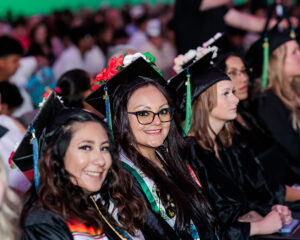McDowell Technical Community College will enhance vocational training and provide comprehensive support services to individuals with intellectual and developmental disabilities (IDD), as well as others facing similar disabilities and learning challenges. As part of their initiative to serve these individuals, the college will hire an Access to Achievement Coordinator. This coordinator will function similarly to success coaches and advisors employed in other program areas at the college. Ultimately, the Access to Achievement Coordinator will work closely with students and their families to connect them with both community and McDowell Tech resources to enhance their success in training and in the workforce.

Funding for these new services is part of a recurring allocation by the NC General Assembly. A total of $3.9 million has been awarded to 15 community colleges across the state who serve the IDD community. This allocation includes administrative funds, which are designated to support a director and two assistant directors at the NC Community College System (NCCCS) Office in Raleigh. Thirty colleges applied for the funding in the current fiscal year. The annual allotments may vary and will be part of the annual budget appropriations by lawmakers.
“We are thankful to the General Assembly for allocating this funding,” said Penny Wacaster, Director of College and Career Readiness and Human Resources Development at MTCC. “Although we have been offering services to the IDD population and similar individuals for several years, these funds will enable us to offer a significantly expanded range of services to meet higher-level needs for these students.”
The new funding will not only support best practices in vocational training, but also provide financial and benefits counseling. It will enhance access to credential and degree programs, including shorter-term micro-credentials. Additionally, it will facilitate the implementation of assistive technology to better serve the targeted population. Assistive technology, as defined by the Assistive Technology Industry Association (ATIA), includes products, equipment and systems designed to enhance learning, work and daily living for individuals with disabilities.
Additionally, Wacaster explained that the funding will support the college in expanding orientation and other programs, and activities designed to more effectively integrate individuals with intellectual and developmental disabilities, as well as those facing other learning challenges, into the mainstream of community college life.
“To ensure that we meet the programmatic and vocational needs of our students with disabilities, we will also conduct essential needs assessments, evaluations and marketing surveys for both current and potential students,” she said. All services offered through the Access to Achievement Coordinator will be tailored to the individualized needs of each student. The coordinator will assist students who have completed their educational and vocational plans in transitioning to successful employment opportunities.
The new Access to Achievement Coordinator’s role extends beyond working with students and families, although this will occupy a significant portion of their time. They will also focus on increasing awareness among local employers about the workforce potential of individuals with intellectual and developmental disabilities. Also, they will collaborate with transportation providers to assist disabled students and workers in commuting to college and worksites. The coordinator will also be responsible for recruiting new students from local high schools and others within the IDD community.
“We already have established relationships with local employers, and we will leverage those relationships to help create suitable job opportunities for our IDD students,” said Valerie Dobson, Vice President of Academics and Student Services and Chief Academic Officer at the college. “However, the initial step is to identify workforce needs and ensure that we provide the necessary training to our students to prepare them for these jobs. This may involve implementing new credentialing programs in some instances.”
In recent years, the college has offered classes to an average of 40 adult IDD students. Some of these students have advanced to traditional curriculum, continuing education and human resources development programs in fields such as Graphic Design, Early Childhood Education and College Transfer. With the new funding, there will be a greater emphasis on vocational and workforce training. The aim is to provide supportive services to enhance the chances of academic and workforce success for individuals in all program areas to the fullest extent possible.
In particular, Dobson and Chuck Bowling, Dean of Students plan to offer comprehensive education with certifications in a variety of areas, including: ServSafe certification to expand workforce opportunities in food service occupations; Personal Care Assistant certification to equip students for roles in the healthcare sector; additional Early Childhood credentials; Hospitality certifications for those interested in the in the hospitality and leisure industry; and RiseUp credentials for individuals aiming for careers in customer service, retail, front desk and logistics. Many students have already completed certifications in First Aid, CPR and OSHA.
“We believe that these new services will be a tremendous support for our students and their families,” said Dobson. “These are the kind of services we have always aimed to provide, but lacked the necessary funding to do so. We are grateful to the General Assembly for allocating these funds and we look forward to bringing our Access to Achievement Coordinator on-board soon and initiating individualized plans for our students.”
For more information, contact Chuck Bowling or Penny Wacaster at 828-659-0459 or 828-659-6001, ext. 137.




